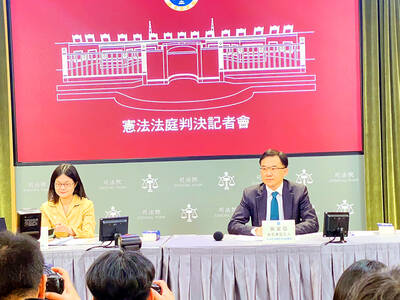Former president Chen Shui-bian’s (陳水扁) son yesterday criticized the Chinese Nationalist Party (KMT), alleging that it was creating social confrontation by amending laws that revoke perks enjoyed by the former head of the state.
“It’s reprisal legislation directed against my father and it violates the basic principle of law — that one is innocent until proven guilty,” Chen Chih-chung (陳致中) told a press conference.
The legislature on Thursday passed an amendment to the Act Governing Preferential Treatment for Retired Presidents and Vice Presidents (卸任總統副總統禮遇條例) introduced by the KMT caucus.
The amendment stipulates that former presidents and vice presidents will be stripped of courtesy treatment, including their monthly allowance and annual expenses, if convicted by a court of grave offenses, such as sedition and graft. The number of bodyguards assigned to former presidents and vice presidents who are convicted of corruption in a first trial will also be reduced.
This means that once the amendment takes effect within the next 20 days, Chen Shui-bian, who was found guilty of embezzlement in his first trial last year, will lose a monthly preferential payment of NT$250,000 (US$7,825) and his NT$6 million annual subsidy for administrative affairs. His bodyguards will be reduced to two.
Describing the amendment as revenge targeting his father, Chen Chih-chung, who is running in November’s Greater Kaohsiung councilor election, urged voters to join him in opposing the KMT.
Chen Chih-chung said the amended law would cause economic difficulties for the former first family. Without the administrative subsidy, his father’s office would be forced to shut down, he said.
Democratic Progressive Party (DPP) Taipei mayoral candidate Su Tseng-chang (蘇貞昌) also challenged the KMT over the amendment, saying the move would deepen confrontation between the pan-blue and pan-green camps.
“Politicized and controversial legislation will deepen social and political confrontations. The government should avoid such divides,” Su said.
Chen was sentenced to life in prison in September last year by the Taipei District Court on multiple counts of corruption. In June, the Taiwan High Court cut his jail term to 20 years.
According to the amended law, his benefits would be restored if he is cleared by the Supreme Court in a final verdict on the case.
Chen Shui-bian has blasted his trial as a vendetta carried out by the KMT administration in retaliation for his pro-independence stance during his 2000 to 2008 presidential term.
ADDITIONAL REPORTING BY AFP

The US government has signed defense cooperation agreements with Japan and the Philippines to boost the deterrence capabilities of countries in the first island chain, a report by the National Security Bureau (NSB) showed. The main countries on the first island chain include the two nations and Taiwan. The bureau is to present the report at a meeting of the legislature’s Foreign Affairs and National Defense Committee tomorrow. The US military has deployed Typhon missile systems to Japan’s Yamaguchi Prefecture and Zambales province in the Philippines during their joint military exercises. It has also installed NMESIS anti-ship systems in Japan’s Okinawa

TRAGEDY STRIKES TAIPEI: The suspect died after falling off a building after he threw smoke grenades into Taipei Main Station and went on a killing spree in Zhongshan A 27-year-old suspect allegedly threw smoke grenades in Taipei Main Station and then proceeded to Zhongshan MRT Station in a random killing spree that resulted in the death of the suspect and two other civilians, and seven injured, including one in critical condition, as of press time last night. The suspect, identified as a man surnamed Chang Wen (張文), allegedly began the attack at Taipei Main Station, the Taipei Fire Department said, adding that it received a report at 5:24pm that smoke grenades had been thrown in the station. One man in his 50s was rushed to hospital after a cardiac arrest

ON ALERT: Taiwan’s partners would issue warnings if China attempted to use Interpol to target Taiwanese, and the global body has mechanisms to prevent it, an official said China has stationed two to four people specializing in Taiwan affairs at its embassies in several democratic countries to monitor and harass Taiwanese, actions that the host nations would not tolerate, National Security Bureau (NSB) Director-General Tsai Ming-yen (蔡明彥) said yesterday. Tsai made the comments at a meeting of the legislature’s Foreign Affairs and National Defense Committee, which asked him and Minister of National Defense Wellington Koo (顧立雄) to report on potential conflicts in the Taiwan Strait and military preparedness. Democratic Progressive Party (DPP) Legislator Michelle Lin (林楚茵) expressed concern that Beijing has posted personnel from China’s Taiwan Affairs Office to its

‘ILLEGAL RULING’: The KMT and the TPP slammed the Constitutional Court judgement, saying it contravened the law and was trying to clear the way for a ‘green dictatorship’ The Constitutional Court yesterday ruled that amendments to the Constitutional Court Procedure Act (憲法訴訟法) passed by the Legislative Yuan last year are unconstitutional, as they contravene due legislative process and separation of powers. The Legislative Yuan on Dec. 20 last year passed amendments stipulating that no fewer than 10 grand justices must take part in deliberations of the Constitutional Court, and at least nine grand justices must agree to declare a law unconstitutional. The Executive Yuan on Jan. 2 requested that lawmakers reconsider the bill, but the Legislative Yuan, under a combined majority of Chinese Nationalist Party (KMT) and Taiwan People’s Party